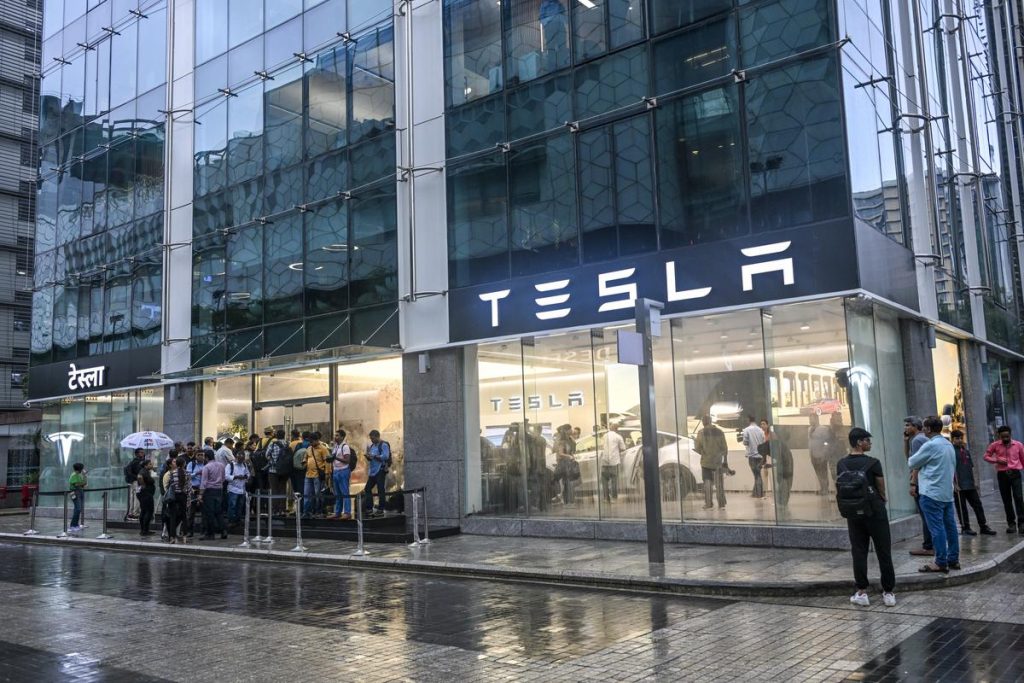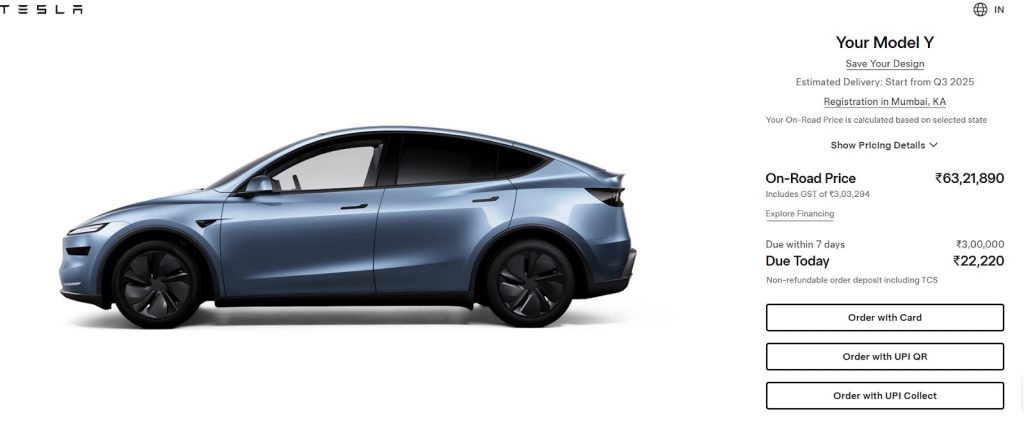Goa is abuzz with excitement as vintage bike and car owners, users, collectors and fans are decking […]

FINALLY TESLA IS HERE IN INDIA… Not with a roar but a whisper! By Asma Torgal
July 19- July 25, 2025, Life & Living July 18, 2025ELON Musk is trending in India again. Not for sparring with regulators, not for his tweets, and definitely not for anything happening in Washington. This time, it’s all about a glass-fronted showroom in Mumbai, where the unmistakable “Tesla Y” has landed and is on show. After years of will-they-won’t-they whispers, India got its first taste of Musk’s electric ambitions, not as a headline in global diplomacy, but as a Rs60 lakh status symbol parked at the now upmarket address of the Bandra-Kurla Complex.
The branded new Tesla E-cars are drawing curious onlookers, smart phone cameras click away, and the occasional social media influencer makes a few enquiries. It’s a quiet entry for a brand known for its thunderclaps.
Tesla officially made its India debut on July 15, 2025 with the launch of its first Experience Centre in Mumbai’s Bandra Kurla Complex. A handful of Model Y units, imported from the company’s Shanghai Gigafactory, were already in place ahead of the opening. Bookings began immediately, with deliveries for the standard rear-wheel-drive variant expected in August, while the long-range version is slated to reach customers between October 2025 and January 2026.
This is not a new vehicle. The Model Y has been on the roads globally since 2020 and is one of the best-selling electric vehicles worldwide. In the United States and Europe, it’s priced in the range of Rs30 lakh to Rs45 lakh. But in India, that same car is listed at nearly Rs60 lakh. That’s the cost of crossing borders, largely inflated by India’s import duties, which can climb to 100% on fully assembled foreign vehicles. This pricing puts Tesla not in the mainstream EV conversation but directly in the rarefied air occupied by luxury brands like BMW, Mercedes-Benz and the Audi.
Tesla’s cautious entry comes after years of on-again-off-again engagement with India’s policymakers. Elon Musk had first hinted at entering India in 2017, a time when Tesla was riding high on investor confidence and global admiration. India’s response then was lukewarm. It asked Tesla to manufacture locally like other global automakers. Tesla, used to being courted, walked away.
Since then, much has changed. Tesla’s sales have slowed in China and the US. The company recently lost its title as the world’s top EV seller to Chinese rival BYD, which now offers a full spectrum of EVs, from budget hatchbacks to luxury sedans, and even manufactures its batteries. Meanwhile, India has quietly emerged as the world’s third-largest auto market. That’s too big for Tesla to ignore, even if the country isn’t ready for it yet.

SO WHY NOW?
THE answer lies in a subtle policy shift. In 2024, the Indian government rolled out a middle-ground solution. EV makers could import up to 8,000 vehicles a year at a concessional 15% duty, provided they committed |Rs4,150 crore in local investment and a promise to start production. It’s a clear invitation, but Tesla hasn’t signed on the dotted line yet. There’s no factory, no local assembly, and not even a firm commitment to any policy. What India has, for now, is a showroom, a few demo units brought in from Tesla’s Shanghai Gigafactory, and whispers of more to come.
That ambiguity is part of the plan. Tesla is testing the waters, not just the consumer response, but how the regulatory landscape evolves, especially as trade talks between India and the United States intensify. If policies soften, Tesla could leap in with local production. If they don’t, the company can always walk away claiming the market wasn’t ready.
This isn’t unprecedented. In China, Tesla pushed hard before getting tax incentives and an express lane to build its Gigafactory in Shanghai. In Germany, the company built ahead of environmental approvals. In the US, it moved its headquarters from California to Texas, collecting generous subsidies along the way. India could be next on that list if the numbers add up.
BUT IT WON’T BE EASY
INDIA’S EV market is growing, but it remains price-sensitive. Barely 5% of passenger cars sold today are electric, and most of those are in the sub-Rs15 lakh segment. A Rs60 lakh Tesla is far outside the average Indian buyer’s reach. Even within the luxury space, sales volumes are thin, around 51,000 units sold in 2024. And brands like Mercedes and BMW have spent years building trust, dealerships, and service networks. Tesla doesn’t have that yet.
There’s also the matter of infrastructure. Public charging is still limited to urban pockets, and many homes lack private parking for overnight charging. On top of that, Indian regulations don’t yet allow features like Tesla’s Full Self-Driving or Autopilot to function legally. That means some of Tesla’s most touted features are essentially switched off in India.
Then there’s the issue of perception. Tesla has spent years teasing Indian consumers, taking deposits, cancelling plans and retreating into silence. Meanwhile, local players like Tata Motors and Mahindra have gone from prototypes to production, building mass-market EVs that resonate with Indian buyers. Even BYD, despite facing regulatory challenges as a Chinese company, has managed to get its cars on the road.
AND YET, TESLA’S PRESENCE DOES MATTER
NOT because it will suddenly change how Indians buy cars, but because it raises the bar. It introduces a new design language, pushes domestic rivals to improve their tech, and forces conversations about software, battery range, and sustainability. It brings aspiration, even if it remains out of reach for most.
Tesla’s entry may not be about today’s sales figures. It’s about staking a claim. If it sets up local manufacturing, India could become a hub, not just for domestic buyers, but as a base to serve other Asian markets. It would tap into India’s growing auto component ecosystem, where many suppliers already support Tesla’s US and China operations.
Until then, the Model Y on display in Mumbai is more a symbol than a product. It’s a signal to policymakers, rivals and consumers, that Tesla is watching, waiting and perhaps planning something bigger.
A second showroom is expected to open in New Delhi by the end of July, expanding Tesla’s footprint beyond Mumbai. Alongside this, the company has announced plans to install four V4 Supercharger stations across Mumbai and the Delhi–NCR region to support early adopters.
However, Tesla has not yet committed to local manufacturing. Its current entry hinges on India’s concessional import duty scheme, which allows up to 8,000 EVs annually at a reduced 15% duty, provided the company invests Rs4,150 crore and outlines a clear localisation plan. Without this commitment, Tesla’s presence in India may remain limited to imports and high-end rental showrooms.
















